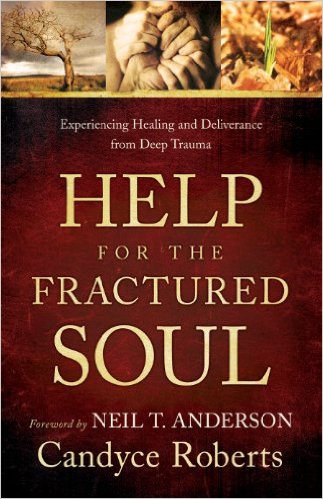Candyce Roberts: Help for the Fractured Soul
 Candyce Roberts, Help for the Fractured Soul: Experiencing Healing and Deliverance from Deep Trauma (Minneapolis, MN: Chosen Books, 2012), 203 pages, ISBN 9780800795320.
Candyce Roberts, Help for the Fractured Soul: Experiencing Healing and Deliverance from Deep Trauma (Minneapolis, MN: Chosen Books, 2012), 203 pages, ISBN 9780800795320.
“I have written this book,” writes Dr. Roberts, “to help those who want to bring the healing mercy of Jesus into the despairing and confusing world of the traumatized” (p.23). More specifically Dr. Roberts addresses the trauma caused by abuse and what can be done to facilitate recovery from the wounds caused by abuse. The abuse most often discussed is sexual abuse which appears to be her specialty.
Roberts gives considerable space to discussing the dynamics of “dissociative identity disorder” more recently identified as a condition affecting memories and inner conflict affecting personality. She relies on research done by Dr. Dan Allender, author of The Wounded Heart. This reviewer is well aware of the resource and Allender’s other book The Healing Path. Roberts chose well. Allender is also on the board of the American Association of Christian Counselors, an association with which this reviewer is a charter member.
Roberts writes for pastors and Christian laity in ministry. She advises her readers to not make any diagnosis of the traumatized but to assure them of the healing that comes through prayer and comforting care. The author uses the word “fractured” and “fragmented” in place of “split” personality. They are also not “hopeless.” Anyone who has experienced childhood abuse “has some defense system in place” (p.29).
“In their search for healing, survivors often put their hope in a type of therapy or a particular therapist, but when hope is based on a human being disappointment is inevitable. Only when our hope is rooted in our heavenly Father can we have assurance of a good future.”
For this reviewer, by way of critique, this is what makes Help for the Fractured Soul both unique and helpful for student, pastor and christian worker. It steers the reader away from a psychological or therapeutic model. She also avoids reliance upon prominent theorists, whether secular or Christian, as “no one shoe fits” all situations. She keeps to a course that is strictly biblical and theological. The author also cautions that “the greater the denial, the stronger the walls of defense, the more divided the house, then the greater chance that those seeking help have not experienced freedom” (p.55).
Also to her credit, Dr. Roberts keeps theory and explanations to a minimum and offers insight by citing individual situations and giving only first names rather than disclosing the full identities of those with whom she ministers. Another attractive element in the book is that the author admits her own limitations. “I never agree to minister inner-healing with those who are trapped in substance abuse”(p.63). She makes referrals and works alongside professionals more capable than herself in areas outside of her own concentration (pp. 65-66). She acknowledges that pain and trauma can be trapped in the physical body as well as hidden in the mind (p.94). “Inner healing,” she explains, “is wholistic, it has an effect on the mind, body, and spirit” (p. 93). Some causes require long-term ministry from several months to “a few years.”
Another feature of Help for the Fractured Soul worth one’s attention is her discussion on the importance of physical health, forgiveness and mental health. She distinguishes forgiveness from exoneration of the abuser and explains the effect that unforgiveness has upon the victim’s emotional, physical, and mental health. She depends upon insights from Larry Crabb (p. 102) and also Daniel Goleman’s work on emotional intelligence (p. 103).
Category: Ministry, Spring 2015


